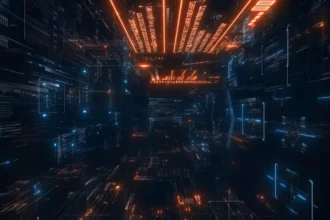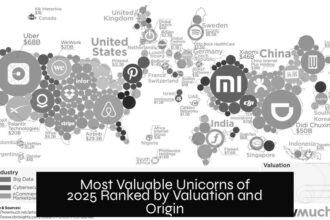Table of Contents
ToggleIs AI Sparking a Cognitive Revolution Leading to Mediocrity and Conformity?
AI is indeed sparking a cognitive revolution that reshapes how people think, create, and work, but this shift carries risks of mediocrity and conformity alongside opportunities for enhanced creativity. The growing integration of artificial intelligence in various fields prompts critical examination of its effects on cognitive processes, creativity, and intellectual diversity.
The Cognitive Shift Driven by AI
AI alters cognitive work by automating and augmenting tasks traditionally reliant on human thought. Designers generate logos rapidly using AI tools; marketers simulate customer profiles with AI models to optimize campaigns. Students draft essays quickly, supported by AI tutors, while software engineers rely on AI assistants for coding.
This widespread adoption raises concerns about dependence. When writers avoid struggling for the perfect phrase or designers stop sketching multiple ideas, cognitive skills may erode. Similar to how GPS use has diminished natural navigation ability, AI’s cognitive prosthetics might reduce humans’ deep engagement with problem-solving and creativity.
Historical Parallels: The Industrial Revolution and Algorithmic Mediocrity
There are clear echoes of past technological shifts, especially the Industrial Revolution, when mechanization replaced artisanal craftsmanship. Mass production enabled efficient and uniform goods but often at the expense of individuality and depth. Similarly, AI’s automation of thought risks normalizing “good enough” outputs that lack nuance.
Generative AI tools such as ChatGPT produce content by analyzing vast amounts of human-created material, predicting likely next words or images. They excel in generating coherent, competent content—press releases, summaries, or lists—but rarely show true originality or deep insight.
The risk lies not in AI’s failure but in human acceptance of the norm where speed and ease overshadow quality and depth. This trend can threaten intellectual richness and diversity, promoting mediocrity in cultural and professional domains.
AI’s Dual Impact on Creativity
Research shows mixed effects of AI on creativity. Experiments demonstrate that people using AI in brainstorming generate more creative ideas on average compared to those using traditional searches or no aids. This suggests AI can elevate baseline creative outputs.
However, AI’s outputs tend to converge on mainstream, widely accepted ideas, limiting the diversity necessary for groundbreaking innovation. AI systems embody biases aligned with dominant cultural narratives, especially those of affluent, English-speaking regions. This constrains the range of perspectives and novel ideas generated.
Moreover, experiments involving AI-assisted medical diagnoses reveal that flawed AI suggestions can implant lasting biases in human decision-making, even after direct AI reliance ends. This illustrates how AI can shape problem-solving approaches, sometimes narrowing creative and critical thinking.
Preserving Creativity Amid AI Advances
True creativity involves conceptual leaps, interdisciplinary thinking, and experiences beyond data remixing—qualities AI cannot authentically replicate. AI invents no future; it reconfigures the past. The unique cognitive abilities of humans remain essential to innovate and explore real-world complexity.
At the same time, AI offers a chance to open new intellectual frontiers, simulating some cognitive functions and even developing novel processes or criteria for evaluating its outputs. This may introduce fresh dimensions to creativity that humans can co-develop with AI.
Professionals, educators, and policymakers play critical roles in steering this cognitive revolution intentionally. Developing frameworks that preserve human creative agency while leveraging AI’s strengths will shape whether the future fosters intellectual flourishing or dependency.
Key Takeaways
- AI revolutionizes cognition by automating tasks and reshaping creative workflows.
- Risks include overdependence on AI, mediocrity, and reduced intellectual diversity.
- AI-generated content often lacks originality, converging on mainstream ideas and expressing cultural biases.
- AI can enhance average creativity but tends to limit idea diversity crucial for breakthroughs.
- True innovation requires human abilities AI cannot replicate, such as conceptual leaps and real-world experience.
- Intentional guidance by professionals and policymakers is vital to harness AI without losing human creativity.
- The cognitive revolution’s outcome remains uncertain—between a renaissance of creativity and intellectual conformity.
Is AI Sparking a Cognitive Revolution That Will Lead to Mediocrity and Conformity?
Yes, AI is indeed sparking a cognitive revolution with the potential to reshape how we think, create, and solve problems—but this revolution walks a fine line between fostering innovation and breeding mediocrity and conformity. Let’s unpack this complex reality and see how AI’s rise is both an opportunity and a challenge.
Imagine AI as a cognitive prosthetic, much like the calculator enabled fast math but led many to forget how to do multiplication by hand. Similarly, tools like ChatGPT can whip up essays, designs, or code snippets instantly. But as dependence grows, are we rewriting the story of human creativity or just hitting “copy-paste” on the collective mind?
First, AI’s cognitive revolution reshapes how students, workers, and artists express themselves. For example, graphic designers now use AI to generate countless logo options in seconds, rather than laboring over sketches. Marketers lean on AI-created customer profiles to tailor campaigns. Software engineers tap AI coding assistants to speed up development. Students draft essays swiftly with AI assistance, while teachers provide rapid feedback using the same technology. This is cognitive evolution at breakneck speed.
But here’s the catch. If a writer no longer hunts for the perfect phrase or a designer neglects dozens of variations before settling on a final design, does skill atrophy? Does reliance on AI numb our taste for nuance, pushing us toward what’s easy and “good enough”? It’s comparable to how GPS chips away at traditional navigation skills—at what cost to foundational cognitive abilities?
The Industrial Revolution’s Echoes in Today’s AI Revolution
To understand the stakes, let’s glance back at the Industrial Revolution. Machines replaced artisanal craftsmanship with mass production, making goods like shoes and cars plentiful and uniform. This efficiency was revolutionary but had a side effect—products lost some individuality and depth. Craftsmanship survived only as a luxury or a form of resistance.
Fast forward to today: AI automates thought, tempting us to mistake speed for quality and quantity for originality. Generative AI tools like ChatGPT, Claude, and Gemini churn out content by analyzing mountains of human-generated text and predicting likely word sequences—nothing more than statistical wizardry masking as creativity.
This means AI excels at producing competent, polished content—press releases, summaries, and advertisements—that sounds human but lacks true genius. The danger? People might accept this “good enough” standard, allowing their work’s intellectual richness and depth to deteriorate subtly, ushering in an era of algorithmic mediocrity.
Can AI Really Make Us More Creative?
Surprisingly, research suggests AI can actually boost baseline creativity. One study showed participants using generative AI achieved higher creative performance than those relying on conventional web searches or no aid at all. This suggests AI offers cognitive shortcuts that spark innovation.
However, there’s a twist: AI tends to narrow the diversity of ideas. Brainstorming with AI often leads to similar, predictable outcomes instead of breaking new intellectual ground. The probabilistic nature of AI means it favors “middle of the road” solutions rather than outliers—yet it’s the outliers that often change the game.
This tendency is compounded by AI’s cultural bias. Outputs align more with the values and outlooks of wealthy, English-speaking societies because these are the dominant voices in the datasets AI ingests. This filtering narrows the range of perspectives AI can generate, limiting its creative horizon.
Worse, AI can also reshape human thinking in subtle, sometimes dangerous ways. In experiments, participants given flawed AI medical advice continued to make similar errors long after stopping AI use. This suggests AI can implant biases that persist in human decision-making, edging us toward mental conformity rather than independence.
The Self-Reinforcing Loop of Cognitive Ease
What starts as a helpful shortcut risks evolving into a routine that diminishes originality not because AI makes poor content, but because human creativity slowly contracts in its shadow. Imagine a loop where easy access to AI-generated ideas makes us less motivated to go deeper, ask hard questions, or pursue unconventional insights.
Is this the cognitive revolution we want? A world where creativity shrinks to what’s statistically typical, and conformity becomes the intellectual default?
Preserving Creativity in the Age of Artificial Minds
Real innovation demands more than remixing past data. It requires leaps—zigging when others zag—cross-disciplinary insights, and firsthand experience of the messy real world. AI, for all its computational prowess, can neither invent the future nor feel the human experiences that fuel breakthrough ideas.
Despite the flood of synthetic content, human creativity retains irreplaceable value. Like a master chef who combines ingredients in innovative ways, humans can blend emotions, intuition, and cultural context in ways AI can’t grasp. Teaching these qualities and nurturing curiosity become vital as AI normalizes fast and frictionless production.
That said, AI isn’t just a cognitive threat. It may open new intellectual frontiers by simulating complex abilities and taking on creative roles like generating new processes or evaluating ideas. Professionals, educators, and policymakers must guide this evolution carefully—deciding how and when AI’s strengths enhance human endeavor instead of diminishing it.
What Does the Future Hold?
The cognitive revolution AI sparks is full of uncertainty. It may spark unprecedented intellectual flourishing or foster dependence and erosion of creativity. Will society prioritize nurturing creativity and critical thinking, ensuring AI remains a tool rather than a crutch? Or will convenience pave the way toward intellectual conformity and mediocrity?
The question remains open but urgent: How do we preserve the richness of human thought while embracing AI’s benefits? Embracing AI thoughtfully demands intentionality—equipping ourselves with skills to challenge AI outputs, fostering diverse perspectives, and cherishing the discomfort that drives true insight. Without this, we risk trading depth for speed, originality for conformity.
Tips For Navigating the AI-Driven Cognitive Revolution
- Use AI to augment, not replace, your thinking. Employ it as a brainstorming partner to jump-start ideas but take time to explore beyond its suggestions.
- Practice mental discipline. Don’t let AI handle every cognitive task. Engage in manual problem-solving and creative exercises regularly.
- Cultivate diverse inputs. Read viewpoints and art from varied cultures and disciplines to counter AI’s bias and expand your creative horizons.
- Encourage educators and leaders to emphasize critical thinking. Resist the temptation to accept AI-generated “good enough” answers without deeper inquiry.
- Experiment with cross-disciplinary thinking. Innovation often hides at the intersection of fields, where AI can offer data but humans bring synthesis.
In this new era, having AI at your side doesn’t guarantee brilliance, but thoughtful use makes excellence possible. The cognitive revolution doesn’t have to lead to uniformity if we dare to think differently, question more, and create beyond the bounds of algorithms. Are you ready to be part of that intellectual renaissance?
Q1: Can AI lead to a loss of deep thinking and originality?
AI can shortcut some thinking processes, making tasks faster but less reflective. It risks promoting mediocrity by encouraging “good enough” solutions and limiting unique thought.
Q2: How does AI affect the diversity of creative ideas?
AI tends to offer predictable suggestions from existing data, which reduces the variety of ideas. This narrows the creative range and may block breakthroughs.
Q3: Is AI causing cognitive skills to decline like GPS affects navigation?
Similar to GPS, heavy AI reliance might dull skills like problem-solving or creativity. People may become dependent, losing practice at original thinking or design iteration.
Q4: Can AI still boost creativity despite these limits?
Yes. Studies show AI can raise average creativity levels by inspiring new ideas, yet it also pulls users toward safer, less diverse concepts.
Q5: Does AI carry biases that influence thought and creativity?
AI outputs reflect dominant cultural values and data sources, often favoring English-speaking, wealthy perspectives. This bias shapes what ideas AI generates and promotes.





